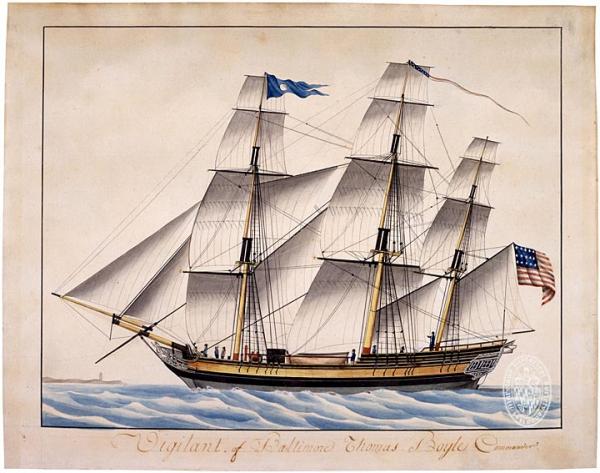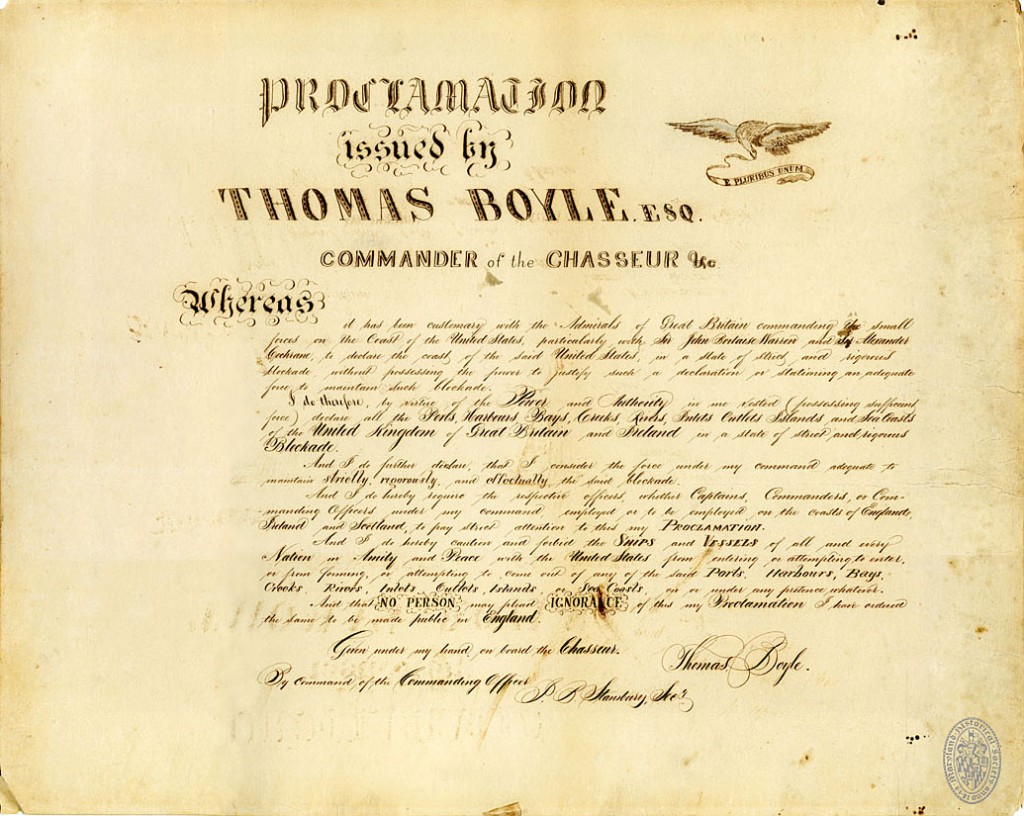Staff Favorites: Thomas Boyle’s Proclamation
The following tale is based on historic fact with a dose of urban legend….
On a dark and stormy night (no, not really) in July 1814, Captain Boyle, a highly successful privateer and commander of the Baltimore-built ship Chasseur, set sail on a cruise across the Atlantic to “take prizes” – to attack enemy merchant ships and take the goods and ship without harming the crew. Typically, Boyle approached his targets by firing a warning shot, and the combatant either fought back, tried to outrun the Chasseur, or “struck its colors”- meaning the ship surrendered.
Boyle’s cruise across the Atlantic was highly successful. After numerous captures, he sailed into the Irish Sea. The Chasseur approached a British merchant ship which immediately surrendered without Boyle even firing a warning shot. This offended Boyle who boarded the ship with a proclamation and told the surrendering captain to post it in Lloyd’s Coffee House in London (the precursor to Lloyd’s of London). The posting of the proclamation caused fear and panic among British merchants leading to increased maritime insurance rates and to the denouncement of the war due to its interference with business.
So what did the proclamation say that was so offensive to the British? Thomas Boyle, commander of Chasseur, blockaded the United Kingdom — the ENTIRE coast and all of the waterways of England and Ireland with one ship, the Chasseur. Such bravado! The document stated:

Vigilant of Baltimore, commanded by Thomas Boyle, ca 1803, Museum Collection M1975.3.2, MdHS.
Vigilant was another ship commanded by Thomas Boyle before the War of 1812, ca. 1803. There is no known image of Chasseur. Most ships of the Chesapeake region built during the early republic were built by eye – meaning shipbuilders did not use blueprints. Many times there is no complete record of the details on a ship’s construction. Logbooks may note size of the vessel and the numbers of guns, crew members, and masts. This information is used to replicate the original as closely as possible
“I do therefore, by virtue of the power and authority in me vested (possessing sufficient force) declare all the ports, harbors, bays, creeks, rivers, inlets, outlets, islands and seacoast of the United Kingdom of Great Britain and Ireland, in a state of strict and rigorous blockade. And I do further declare, that I consider the force under my command adequate to maintain strictly, rigorously, and effectually, the said blockade.”
After this was posted in London, four British men-of-war chased Chasseur on its return trip to America. However, Boyle, not an easily intimidated man, continued to capture prizes as he sailed home. When the Chasseur arrived in Baltimore in March 1815, the city celebrated by renaming the vessel the “Pride of Baltimore.” (And, yes, this is the original Pride of Baltimore.)
Was this tale a farce? Well, yes! Was Boyle disgusted by the British blockade? Did Boyle feel that his blockade was just as legitimate, or illegitimate, as England’s blockade on American ports and harbors? I have a few other questions about this document and the story. If posted in Lloyd’s of London, how did MdHS get it? When was it created? Aboard the ship? Before he left? Were multiple copies made? Part of me doesn’t want to know because it’s such a good story the way it is. I love this document because of its audacity and because after 200 years, the story of the Pride of Baltimore is still a part of Baltimore’s collective consciousness and culture. The Pride of Baltimore II continues to sail around the world as a goodwill ambassador for the city, and Fort McHenry salutes the vessel by firing a cannon each time she sails into port.
Here is a transcription of the entire proclamation – enjoy!
“By Thomas Boyle, Esq., Commander of the privateer armed brig Chasseur, &c., &c.,-Proclamation: Whereas it has become customary with the Admirals of Great Britain, commanding small forces on the coast of the United States, particularly Sir John Borlaise Warren and Sir Alexander Cochrane, to declare all the coast of the United States in a state of strict and rigorous blockade, without possessing the power to justify such a declaration, or stationing an adequate force to maintain said blockade. I do therefore, by virtue of the power and authority in me vested (possessing sufficient force) declare all the ports, harbors, bays, creeks, rivers, inlets, outlets, islands and seacoast of the United Kingdom of Great Britain and Ireland, in a state of strict and rigorous blockade. And I do further declare, that I consider the force under my command adequate to maintain strictly, rigorously, and effectually, the said blockade. And I do hereby require the respective officers, whether captains, commanders, or commanding officers, under my command, employed or to be employed on the coasts of England, Ireland, and Scotland, to pay strict attention to the execution of this my proclamation. And I do hereby caution and forbid the ships and vessels of all and every nation, in amity and peace with the United States, from entering or attempting to enter, or from coming or attempting to come out of any of the said ports, bays, creeks, rivers, inlets, outlets, islands, or seacoasts, under any pretence whatsoever. And that no person may plead ignorance of this my proclamation, I have ordered the same to be made public in England. Given under my hand, on board the Chasseur, day and date as above. Thomas Boyle. (By command of the commanding officer) J. J. Stanbury, Secretary.”
(Debbie Harner)


